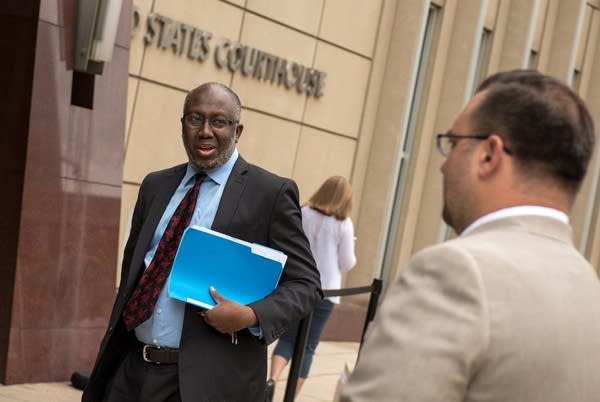February trial date set for Minnesota ISIS terror suspects

Go Deeper.
Create an account or log in to save stories.
Like this?
Thanks for liking this story! We have added it to a list of your favorite stories.
Updated 4 p.m. | Posted 12:16 p.m.
A federal judge on Wednesday set Feb. 16 as the trial date in the cases of seven Minnesota men accused of conspiring to join the ISIS terror group.
The suspects were in court Wednesday morning as Judge Michael Davis weighed next steps in the high-profile cases.
Turn Up Your Support
MPR News helps you turn down the noise and build shared understanding. Turn up your support for this public resource and keep trusted journalism accessible to all.
Davis denied most of the pretrial motions before him, and lawyers for the defendants withdrew some of the motions they'd filed, including requests for disclosure of polygraph examinations.
The defendants' lawyers have said they should be given the name of a confidential informant and be allowed to interview him in preparation for the trial.
Prosecutors said they won't make the informant's name public at this time out of safety concerns for him and his family, but will disclose him as a trial witness.
All the defendants — Hanad Musse, Mohamed Farah, Hamza Ahmed, Zacharia Abdurahman, Adnan Farah, Guled Omar and Abdirahman Daud — were in the courtroom and sat next to their lawyers. They smiled at their families and fixed their eyes on FBI agents who came to testify against them.

Davis said he'll review each case separately as he continues to explore supervised released plans for the men.
"There's meetings going on all the time that you don't know about," Davis told defense attorneys, referring to the court considering options under special supervised release.
Some lawyers reiterated that they want their clients to be released to a halfway house, but the judge said there's no plan in place at the moment and ruled that the suspects will remain in jail while they await trial.
The court heard from FBI agents who described intercepting several of the suspects after they rode a Greyhound bus from Minnesota to New York City, hoping to board an international flight on their way to Syria, allegedly to join ISIS.
FBI agent Michael Lewis flew in from New York to testify about his interview with Musse and Mohamed Farah on Nov. 8 last year as the two men, along with Ahmed and Abdurahman, allegedly attempted to travel from John F. Kennedy International Airport in New York City.

Musse and Farah had trouble checking in for their flights because they're placed on a no-fly list, Lewis said. He met the men separately at the JFK terminal after he received an email from the FBI's Minneapolis division.
He said he told them that he could resolve their issue if they told him what their plans were. As the interview went on, Muse and Farah felt "irritated" and were "annoyed at not being able to travel," Lewis said.
FBI agents observed the men after they left the airport and arrived at the New York's Port Authority Bus Terminal on their way to Minneapolis.
When the men returned home, FBI special agent Harry Samit and a group of other agents were waiting for them. Three agents, including Samit, interviewed Ahmed for more than 30 minutes at an employee break room and secretly recorded his conversation at the Greyhound station in Minneapolis.
After the hearing, Somali community leaders said they were disappointed the judge didn't agree to any of the proposed plans for supervised release, which would involve community service and religious counseling.
"We're very disappointed because we thought the plan we submitted was a very comprehensive plan," said Sadik Warfa, deputy director of Global Somali Diaspora. "The community backed up the plan. We showed [the defendants are] not a flight risk and not a danger to the safety of the community."
MPR News reporter Doualy Xaykaothao contributed to this report.



